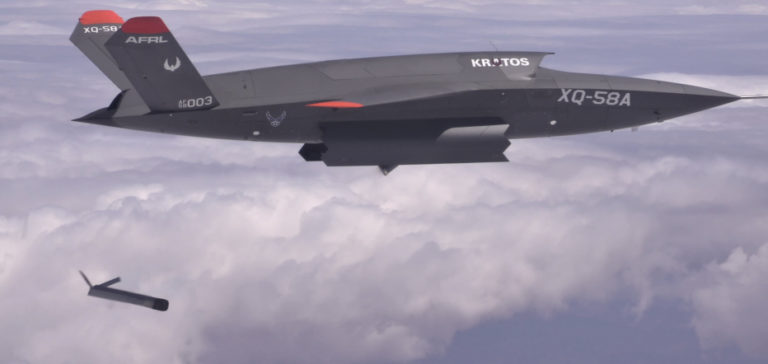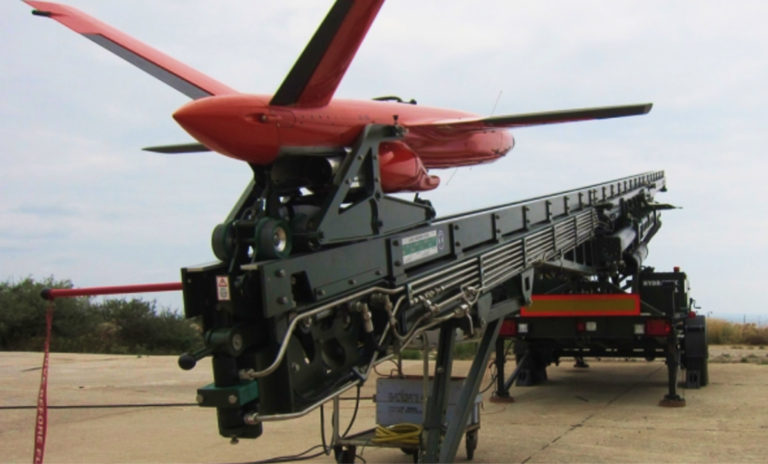
Kratos operates differently than your typical defense contractor. It is a public company that acts more like a venture-backed, high-tech startup. Rather than waiting for the customer to begin a program of record or issue a Request for Proposal, Kratos anticipates a need and gets to bending metal, shaping composites, or writing software–on its own dime.
The result, says Eric DeMarco, president and chief executive officer of Kratos Defense & Security Solutions, Inc., is that when the customer is ready to actually buy something, Kratos is ready with a product that closely matches the specifications. These products typically utilize commercially available technology, keeping costs to a minimum and driving affordability in a world of increasing threats and declining defense dollars.
Kratos also has proven adept at leveraging supply lines for existing products to rapidly develop new ones. A prime example is the company’s Air Wolf tactical drone.
In this Q&A, DeMarco discusses the benefits and challenges of Kratos’ disruptive approach to defense contracting.
Breaking Defense: How has being an agile, tech-focused company allowed you to approach defense contracting differently?
DeMarco: It’s enabled us to take more of a commercial approach where we don’t have to chase formal requirements or programs of record. We meet with Army, Air Force, Space Force, Navy, and Marine Corps customers. We look at their strategy papers on what they believe they’re going to need three, four, five years from now. We go to our board, which includes venture capitalists, and brief them on it. With their approval, we will then actually develop and build a functioning system and take the solution–not a PowerPoint – to the customer.
We can literally go and design, develop, build, and demonstrate things for the customer very rapidly, in a year or two, and get their feedback. If they like it, we make some tweaks and are able to deliver it to them much quicker than the traditional defense approach allows.
Breaking Defense: Isn’t that risky?
DeMarco: We minimize our schedule risk, our technical risk, and financial risk because we primarily use proven technologies, many of which are found commercially. So there are quantities out there, which means low cost. Affordability is a key aspect of this commercial-venture approach that we take. It is central to Kratos’ mission.
If we come up with and deliver the right product, at the right time, at the right price, we should win. The customer should acquire it. We think that gives the customer an advantage both financially and against our adversaries.
Breaking Defense: Are there drawbacks to this approach?
DeMarco: We probably have a handful and a half of products and systems that are in the infamous valley of death. We’ve flown them, we’ve demonstrated them–satellite systems, ground systems, drone systems–and we’re trying to get into a program of record or get to a quantity production scenario. That’s the risk.
However, we think the benefit, more times than not, outweighs that risk. Because our affordable, leading-edge systems are built from proven, mostly commercially available technologies, we are able to quickly pivot and break out subsystems that have more immediate applications and offer the same advantage of affordability. And we believe that our approach is the right approach for our country and the Department of Defense.
Breaking Defense: Are you willing to have some products of yours die of thirst in the valley of death?
DeMarco: I don’t want to say willing. We’re doing this eyes wide open. But obviously we are in constant, direct communication with the user community. We know that our customers want this, and we are confident in our model. It provides significant benefit to the Pentagon and allows their needs to be met before they know they exist. The valley of death is not a nefarious thing. The users want us to get our technologies across it and established as programs of record, but they obviously have rules and processes they have to follow.
I’m sure those rules were very effective and appropriate at the right time. Today, with how fast China is moving, and how fast Russia is moving in certain areas, we as a country have to change the paradigm and look at these rules and the traditional way we have been developing and procuring defense technologies to ensure rapid-development companies like Kratos can get our products to the user and we don’t fall behind our near-peer adversaries.
Breaking Defense: You’ve cited your Burns Flat drone facility in Oklahoma as an example of Kratos’ venture philosophy. How did that come about?
DeMarco: We made the decision four or five years ago that our next drone production facility was going to be in Oklahoma. While we were pursuing that, we became aware of an old spaceport out in Burns Flat. So we checked it out, and we said to ourselves, ‘wow, if we could work with the state government, the appropriate local government, Senator Inhofe’s Office and the FAA, and we could get approval for the Burns Flat spaceport to be a real drone port–not for quad copters, but for jet drones–that Kratos and other companies could use, that would significantly increase the speed of development and flight and reduce the dependence on the government customers.’
As you probably know, the long pole in the tent is getting on weapons ranges. Getting on ranges is very costly. With our now operational unmanned division production facility nearby and a state-run testing range at Burns Flat, we could test on a very short notice instead of having to schedule something on a weapons range months and months in advance.
In August, we flew our Air Wolf at the newly approved Burns Flat Test Range for the first time. We are confident that access to this less scheduled, local range will further increase Kratos’ ability to rapidly develop and demonstrate jet drones, supporting subsystems, and other tactical and target systems and aircraft.
